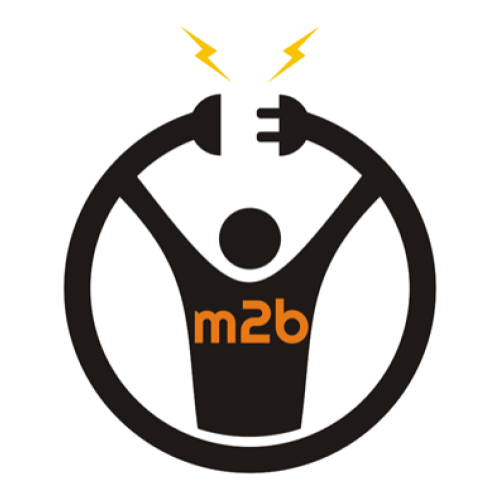Labour market inclusion and social integration of migrants
The migrants2business.eu initiative is based on two pillars:
-
a holistic approach model, envisaged to provide migrants with a combined offer of training and regulatory advice, support to build social capital, for access to business funding and provision of company housing and working spaces.
-
a cross-horizontal cooperational model designed to improve, through the resource sharing and networking approach, the individual operational capacity of the small and medium-sized organisations that are the common providers of migrant entrepreneurship support measures.
The m2b project aims to develop and test a system which wants to become the reference and the operational model for the large number and most common providers of migrant entrepreneurship support measures. The solution takes inspiration and merges the Evaluation and Analysis of Good Practices in Promoting and Supporting Migrant Entrepreneurship Guide book with some specific experience driven by the m2b members and their partners, such as the Migrants / Minorities Inclusion Strategy Paper and the online entrepreneurship training developed in an Erasmus+ initiative.
This initiative has created a training method dedicated to developing entrepreneurship skills of young people, with a special focus on those being migrant or having minority background.

The m2b project also harvests the experience achieved during the the Erasmus for Young Entrepreneurs model in which the Entrepreneurs’ Mobility team has been successfully involved from the first cycle of the programme (www.erasmus-entrepreneurs.eu). Four partners of m2b (CSCS, Asset Tec., Dekaplus and Abuplus) are part of Entrepreneurs’ Mobility team which is the most successful consortium in the programme, recruiting the highest number of Host and New Entrepreneurs and enabling the second highest match between each other.
The m2b problem analysis has identified and strives to address two main aspects:
-
the relevance to the specific challenges faced by the migrant entrepreneurs to establish and manage their entrepreneurial activities in the receiving countries.
-
the lack of combined solutions offered by the largest number of providers of migrant entrepreneurship support measures
Considering the specific challenges faced by the Migrant Entrepreneurs (ME), the m2b project identifies structural and cultural obstacles that they have to overcome, considering both the aspects as a unique factor related to their capacities. The "structural factors", are obstacles that deal with social and economic conditions like the difficulties deriving from the nature of regulation in the the host country, the possibility to access to finance, to local business networks or to business facilities, the obstacles to get the start-up capital, etc. and the "cultural factors" instead, regard more the difficulties linked to the entrepreneurial and business abilities, like the lack of familiarity that they often have with the functioning of local labour markets and with the local business regulatory frameworks, the differences of the cultural background, the language barrier, etc.
Regarding instead the lack of combined solutions offered to the migrants by the supporting organisations, the m2b team considers that many small but also medium-sized organisations experiment a systemic difficulty to provide a holistic, multidimensional support as this tends to be too resource-intensive for them. The studies show that the small and medium-sized providers are the most common organisations operating at the local level and are also the more unprepared to give an effective and consistent holistic, multidimensional support to migrant entrepreneurs: these kind of organisations can rarely facilitate the access of migrants to funding and facilities and they often face difficulties also to provide business trainers and regulatory advisers specialised to serve the immigrant population. To address these problems, the m2b initiative develops and pilots an ‘ecosystem’ model suitable to improve the capacity of providers with a complete set of tools and a cross-horizontal cooperational set of procedures. This solution is replicable for the vast network of small providers and looks to a pan-European systemic dimension making any local level organisation, often modest and also voluntary, able to solve its usual difficulties in releasing such too resource-intensive services.
The m2b model can make any small organisation able to provide a cost-effective multidimensional support to migrant entrepreneurs, thanks to the positive effect of the resource sharing approach promoted by its cross-horizontal cooperational model. In its intentions, the migrants2business.eu approach, being thought to create and pilot a set of tools and a cooperational model suitable even for the smallest local level organisations, doesn’t address the common organisational problems faced by the largest organisations that work with a massive investment of resources and that can solve their need to provide such resource-intensive services with their own consistent investments. The m2b project is cost effective by providing a one-stop-shop for migrant entrepreneurs offering extensive range of services and ensuring that they obtain optimal results from the training and mentoring received. The effectiveness of the services provided also measured by to which extend the activities reach and their being synergized and internalized by other stakeholders. For instance, the indicative letters of support collected by many major institutions active in the field of immigrants and entrepreneurship in partnering countries and by migrant communities such as Moldova, Burundi, Turkish migrant communities will raise the effectiveness, prevalence, synergy and internalization of the activities maintained among stakeholders local, national and European level.